Our Department of Law has achieved outstanding positionings and student satisfaction rates in the National Student Survey, conducted by Ipsos MORI on behalf of the Office for Students, in which nearly half a million students across the UK are invited to participate every year. The survey is a key component of the quality assurance and wider regulatory landscape in UK higher education.
We are thrilled to announce that, based on NSS satisfaction rate results published last week, we are the No. 1 Law department in the UK for the organisation and management of our LLB degree (with a 94 per cent satisfaction rate), and the (joint) top Law School in the UK based on whether teaching in the LLB Law course is ‘intellectually stimulating’ (with 100 per cent satisfaction rate); we are (joint) No. 4 in the UK, best Law School in London and best Law School in the South of England, for quality of teaching more broadly.
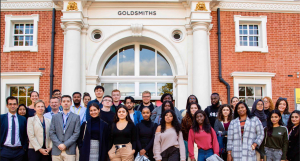
Class of 2022 (who took part in the NSS), when they started their LLB journey in September 2019.
A 92 per cent satisfaction rate on the question of whether the programme has “challenged [students] to achieve [their] best work” has us at No. 5 in the country (top in London, top in the South of England) and tells the Goldsmiths Law story very well; we aspire to challenge our students intellectually every step of the way, immerse them in formal legal environments, let them feel fully confident in being there, and about themselves, empower them to pursue any career path they choose to pursue, traditional destinations or less traditional so, and more modern paths, appropriate for 21st century graduates, even disruptive ones.
Our innovative approach to ‘learning opportunities’ in the degree (where we embed in contact time, in all our modules, across Years 1-3 of the LLB, invaluable learning opportunities that go outside learning in the classroom e.g. interactive workshops and trial observations at the Supreme Court and ‘Old Bailey’, immersive jury trials, and specialist workshops by legal professionals, human rights NGOs and technology experts) has brought us impressive recognition in this area, where we rank No. 3 in the UK, No. 1 Law School in London, and No. 1 Law School in the South of England. On the more specific question of whether the course has provided students opportunities to apply what they have learnt, we rank No. 3 in the UK, a reflection of our very substantial focus on integrating theory and practice throughout the degree, from experiential learning opportunities and placements to an Advocacy-based Criminal Evidence module, a Human Rights Law & Clinic module and preparation for the new Solicitors Qualifying Examination.
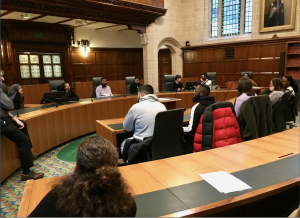
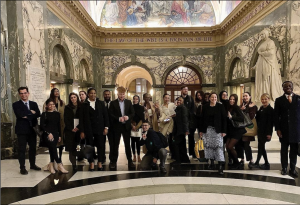
Class of 2022 taking part in a workshop at the UK Supreme Court (September 2019, above left) and participating in a criminal law mock trial at the Old Bailey (March 2022, above right).
Our students value our close-knit, empathetic learning community above all things in the degree. The students who filled the NSS were the inaugural cohort for our LLB Law programme and suffered unprecedented disruption as a result of the pandemic. However, our emphasis on live, synchronous, online lectures during lockdown periods, which allowed us to have unique opportunities to interact with them even at that most challenging of times, the speed with which we returned to 100 per cent face-to-face delivery (from September 2021, being one of the first Law Schools to achieve this in the UK) and the close working and personal relationship that both academics and students cherish in our department, must explain why student satisfaction in this area has us as No. 4 in the UK, and best Law School in London, for academic support.
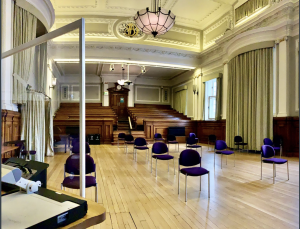
Even in the autumn of 2020, we were continuing with in person activity, in large, well-ventilated rooms (photo: the Council Chamber at the time of the pandemic, which we were using for our Wednesday experiential activities—mock trials, debating etc—throughout the pandemic, outside periods of lockdown).
The survey allows students to (anonymously) enter free text comments (in addition to rating their departments across different areas). In submitting such comments, one of the students focussed on ‘the way [the Department] managed our course in response to COVID. Maintaining live online lectures, rather than pre-recording like most others. Getting back to face-to-face teaching in large, ventilated, socially distanced spaces as soon as possible and generally being very communicative, has been wonderful.’
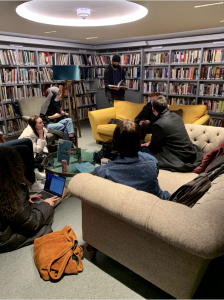
Students and staff catch up, over coffee, at the Royal Society of Arts in the Strand, after a field trip in London.
Another student spoke about the distinctiveness and personal character of the student experience at Goldsmiths (we are very grateful for such heart-warming words): ‘For the size of our cohort, it has been an amazingly good experience in terms of how lucky I have been to get to know them all. I hear often from my friends in departments with bigger cohorts that they feel disincentivised by having never really gotten to know their lecturers personally even in three years – for us that could not be further from the truth. They have always encouraged us not only with our submissions but with a vast array of extracurricular activities, trips, and invitations to guest lectures. The things I have taken part in now sit proudly on my CV and give me confidence in moving forward once leaving Goldsmiths. When I look back at myself 3 years ago until now, I have flourished, the degree has equipped me with everything I need to begin a lifelong career in law; including the heads up about a potential job which I went and interviewed for and got, first time.’
To look at other areas surveyed in the NSS: we are the No. 1 Law department in London (No. 7 in the UK), for assessment and feedback, an area that traditionally Law departments find challenging in the context of the NSS. Goldsmiths Law invests huge energies in innovating in this area, particularly by having introduced portfolio/reflective journal-based assessment by student engagement and participation, which empowers a much broader range of learners to achieve well academically and substantially enhances student satisfaction. On the more specific question of whether marking and assessment has been fair, we are ranked No. 3 in the country.
We are No. 5 in the UK, No. 1 in London and No. 1 in the South of England, for learning resources. We are delighted with this result, as we have sought to innovate in this area since launching our degree, particularly by opting for a ground-breaking digital library, which includes electronic access to e-textbooks for virtually all modules in the LLB degree, freeing our students from the significant extra cost of purchasing these textbooks or the anxiety of securing one of the hard copies available through a library loan. Lecture week-by-lecture week, we also provide a very analytical digital reading list, in all our modules, giving students quick access to a plethora of electronic resources aimed to support their learning, from journal articles and e-book chapters to governmental reports, newspaper articles and even relevant podcasts, videos, films and other electronic recordings.
All this was picked up very accurately by one of the anonymous free text student comments: ‘The Law Department has made the course better accessible to low-income students by providing most of the reading throughout the course online. All my modules have been intellectually stimulating and enjoyable. In spite of the pandemic, many opportunities have been provided to us to expand our knowledge outside the university.’
The survey asks students whether they ‘feel part of a community of staff and students’ and whether they have had the right opportunities to work with other students as part of [their] course’, and in this area too we have achieved an outstanding result: No. 3 in the UK, best in London and best in the South of England.
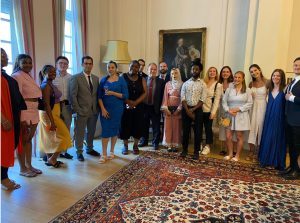

With a group of our final year students (and Year 1 students) in our inaugural summer school in Athens (June 2022), at the the residence of the British Ambassador in Athens (above left), Matthew Lodge, and at “Mikrolimano” in the port of Piraeus (above right), at a social and cultural outing during the programme, cementing solid friendships, between students, and between students and staff.
Similarly, the survey asks students whether they have had the right opportunities to provide feedback on their course, whether staff value students’ views and opinions about the course and whether it is clear how students’ feedback on the course has been acted on. With 90 per cent satisfaction rate on these questions, we are No. 4 in the UK and the No. 1 Law department in London. On the important question of whether it is clear to students how their feedback has been acted on, we are ranked No. 3 in the UK.
The overall student satisfaction rate is an impressive 91 per cent for the LLB Law programme.
The Head of the Department, Inaugural Professor in Law at Goldsmiths, Dimitrios Giannoulopoulos, commented: ‘From the very first moment of conceiving the idea for a Law programme, and Law department, at Goldsmiths, we strongly aspired to create a fresh pedagogical approach to legal education, one that would do justice to what Goldsmiths has always stood for, intellectually and culturally, within the University of London and beyond: an unceasing passion for widening participation and empowering young people. With an uncompromising attachment to major liberal democratic values—social justice, equality, fairness, human rights, cosmopolitanism, the rule of law—our Law programmes and department have attracted students from an impressive range of destinations and backgrounds, non-traditional backgrounds in many cases. And since then, we have been most privileged to work with refreshingly vibrant, hugely talented young people, while also drawing on the experience and intelligence, and superb work ethic, that some more mature students have graciously injected into our degree.’
Dimitrios added: ‘In view of all this, and in view of the ways in which our most dynamic faculty has connected with our student body since launch, exposing them to major contemporary debates, expecting nothing less from them than absolute commitment to being critical thinkers (never taking legislation and case law at face value), these outstanding NSS results, that we are in cloud 9 about, are simply a (wonderful) confirmation of what we knew already, about how special a programme we feel we are beginning to build, and how strong a bond—an unbreakable bond—we have cemented with our students.’
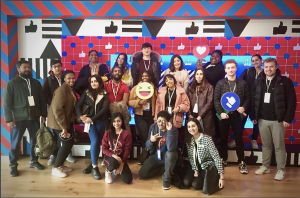
Class of 2022 visiting the legal department of Facebook in London (February 2020)
As one of the students who participated in the NSS put it (through the anonymous free text comments again), the Law faculty “have been incredibly helpful and supportive and have often gone the extra mile to help me with issues, advocating on my behalf, putting me in contact with helpful people and always demonstrating that they care about us. They have always gone over and above to support us.” The student added that “the course has really been brought to life with a variety of teaching techniques, visits to law firms, courts and various offices. Not to mention that the very particular flavour of studying law at Goldsmiths has been wonderful, always encouraging us to critique the law, understand it in context and see the implications through a socio-legal lens.”
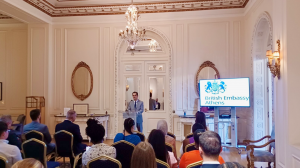
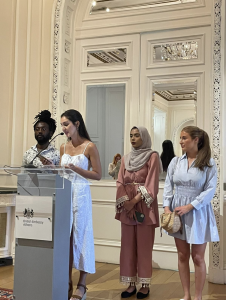
Exposing our students to formal environments, giving them confidence to pursue the careers they desire: Head of Department, Prof Dimitrios Giannoulopoulos, and Goldsmiths Law students, presenting the concluding observations of our summer school to the British Ambassador in Athens (June 2022)
The Head of the Department added: “These NSS results are spectacular for us, and I cannot find the words to thank our students for the confidence they have invested us with, their unshaken belief in us. I am equally grateful to all my colleagues, who give everything they have, week in, week out, to ensure our vision manifests itself, with major aspects of our programme, but with the more trivial functions too, the day-to-day support, which matters.”
And he noted in conclusion: “These results follow on from equally exciting news about our research; we were submitted to the REF 2021 (with the Sociology department) and were again delighted to have contributed, through our publications, to one of the top research performances in the country (on publications/‘research outputs’). As we’re preparing to launch an exciting range of postgraduate/LLM degrees from September 2023, our teaching and research strengths are perfectly aligned and provide unique momentum for us; as we continue to grow, we’re hugely looking forward to new generations of Goldsmiths students and leading Law faculty joining us and becoming an integral part of who we are (and who we want to be in the future).”